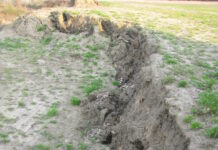Photo credit: DiasporaEngager (www.DiasporaEngager.com).
In March, anti-Israel activities on college campuses were characterized by the rapid revival of resolutions or referendums, which frequently accused Israel of genocide:
- The Tufts University student government approved a Boycott, Divestment, and Sanctions (BDS) resolution that demanded divestment from Israel, the end of study abroad programs in Israel, boycott of specific products on campus, and university acknowledgement of the Palestinian “genocide.” Jewish students report having been spat on and verbally abused during the debate, which was not conducted according to established procedure. The university rejected the call for BDS, and claimed it would investigate abuse of Jewish students.
- The University of California at Santa Cruz student government approved a boycott resolution calling on the university system to divest from Israel and companies working in Israel.
- The Barnard College student government approved a motion to present a BDS referendum to the student body. The referendum calls for “1. Divesting all stocks, funds, and endowment and refrain from further investment in companies profiting from or engaging in Israeli apartheid; 2. Canceling the opening of the Tel Aviv Global Center; 3. Ceasing the Dual Degree Program between Columbia University and Tel Aviv University.”
- Union Theological Seminary’s student government passed a resolution demanding divestment, and calling to “End all promotion of Israeli Settler-colonialism via academic ties through including but not limited to Fulbright Israel as well as hosting any Zionist speakers amplifying settler-colonial propaganda.”
- Vanderbilt University administrators canceled a student government vote on a BDS resolution after warning the measure would contravene state law regarding divestment from Israel. In response, protestors occupied an administration building for 22 hours where they reported “inhumane” treatment by police, including denial of bathroom access. Twenty-five students were arrested and 16 were suspended.
Protests demanding divestment were held at other campuses including a disruption of the annual Honors Convocation at the University of Michigan, the University of California at Santa Barbara, UCLA, Edinburgh University (where a building was occupied overnight), University College London (where a room was occupied, and demands for divestment were issued), and at Emerson College, where 13 students were arrested protesting the inauguration of the new president.
Pro-Israel speakers were harassed and canceled at a number of campuses:
- At the University of Kentucky, protestors disrupted a speech by pundit Ian Haworth, causing the police to clear the building, after which protestors pulled a fire alarm. No arrests were made. One protestor was quoted as saying “Wow, okay, we disrupted it successfully.’ That was our whole thing, we don’t want this individual to even have space to speak at our institution.”
- At the University of California at Irvine, the Jewish Studies program head stated that he could no longer hold public events related to Israel due to persistent harassment by pro-Hamas protestors, and that even talks on Yiddish and the Holocaust had been disrupted. No disciplinary measures have been taken by the university.
- A talk at Indiana University by former Hamas member Mosab Hassan Yousef was also canceled after the Students for Justice in Palestine (SJP) chapter accused him of “Islamophobia,” resulting in threats from the local Muslim community.
- A talk at Georgetown University Law School by an Israeli reservist was disrupted by pro-Hamas protestors, who warned the speaker’s “proximity to these crimes make it likely that he contributed to the war crimes and genocide in Gaza.”
The Muslim Student Association at Concordia University demanded the institution ban “Islamophobic language,” and also provided a long list of terms that would result in a group being banned. These included “jihadist,” “Hamas supporter,” “rape apologist,” “Islamist,” “Shariah,” and many more.
Harassment of Jewish and Israeli students also continued on campuses:
University facilities vandalized by pro-Hamas protestors include a computing laboratory at Cambridge University and inside a student union at Manchester University, where “kikes out” and “up Hamas” were scrawled. Jewish institutions on campus also continued to be vandalized, including the Queens College Hillel (which also received threatening messages), the University of Texas at Austin’s Hillel building, along with buildings associated with Zionists — including the Golda Meir Library at the University of Wisconsin at Milwaukee, which was vandalized with “Free Palestine.”
One new study shows that Jewish students are hiding their identities, and pay a social penalty for supporting Israel. Another study indicates that very liberal students know they are expected to not be friends with Israel supporters but at the same time know they are not supposed to discriminate. Overall, the conformist culture of elite schools in particular helps amplify anti-Israel attitudes.
Faculty members continue to take aggressive stances attacking Israel and in defense of Palestinians and Hamas. Faculty for Justice in Palestine (FJP) chapters dedicated to supporting SJP chapters continue to spread to “raise awareness about settler colonialism, ethnic cleansing, genocidal policies and actions, and everyday violence against Palestinians,” and are invariably accompanied by claims that “pro-Palestine speech” is being “silenced.”
Faculty are also at the forefront of normalizing pro-Hamas viewpoints. One example at Barnard College is a session called “Resistance 101” hosted by the Barnard Center for Research on Women which featured Popular Front for the Liberation of Palestine (PFLP) leader Khaled Barakat. Upon questioning, Columbia University canceled what it called an unsanctioned event, which was then moved to a private space on campus. Observers argued that the event constituted material support for terrorism since the PFLP is a designated terrorist organization.
Faculty members have taken the lead in demanding their universities terminate relationships with Israel. University of Turin faculty members voted to end a research agreement with Israeli universities. The University of Montreal’s SGPPUM faculty union also voted to demand the university cut off relations with Israeli universities as well as demand an arms embargo and a ceasefire.
The US Department of Education continues to open investigations of antisemitism at colleges and universities, as well as public schools, and the House Committee on Education and the Workforce expanded its own investigation to include UC Berkeley. Committee chair Rep. Virginia Foxx (R-NC) noted that Harvard’s failure to comply with a subpoena for documents could result in a cutoff of some $625 million in Federal funding.
Anti-Israel and antisemitic propaganda from K-12 teachers remained a focal point in March. Elementary school indoctrination was one focus, as was targeting Jewish teachers:
The systemic nature of antisemitism at the K-12 levels, and the manner in which teachers’ unions have been co-opted by anti-Israel activism, was demonstrated in Massachusetts. The Massachusetts Teachers Association hosted a webinar, developed with the help of Jewish Voice for Peace, entitled “The Struggle Against Anti-Palestinian Racism,” which was described as an exploration of questions including “What is anti-Palestinian discrimination? How does Palestine fit into the larger framework of colonialism and imperialism? What are Zionism and anti-Zionism, and what are their histories? Why is anti-Zionism not antisemitism?”
Mass public protests aimed at disrupting transportation and commercial activities also continued in March. Protestors demanding a “ceasefire” blocked the San Francisco Airport, the New York Times and New York Post printing plant, London’s Liverpool Station, and the steps of the Metropolitan Museum of Art and the British Museum. Britain’s leading counter-extremism official warned that pro-Palestinian protests were making London a no-go zone for Jews and that radicalization was spreading throughout British society.
Protestors repeatedly vandalized locations associated with Israel, such as Effy’s Cafe on the Upper West Side of Manhattan and Nanas Kitchen in Narberth (PA). Protestors also disrupted the San Francisco Jewish Community Relations Council gala, the opening of the Amsterdam Holocaust museum, which was attended by Israeli president Isaac Herzog, and an Israeli speaker at the Los Angeles Holocaust Museum.
Private dwellings were attacked, including a rock thrown through a window of a home and mutilation of hostage posters displayed outside a home in Newton (MA). A protest at a real estate fair in Teaneck (NJ) synagogue, which allegedly advertised homes in the West Bank, was protested by Palestinian-Americans who drove from nearby Paterson. Several bottles were thrown at attendees and at police. A similar real event in Brooklyn was canceled due to security concerns.
The result of continued protests, harassment and vandalism targeting Jewish individuals and institutions is a growing need for security measures including physical protection and secrecy regarding venues.
It’s a troubling time to be Jewish in America — especially on campus.
The author is a contributor to SPME, where a different version of this article originally appeared.
Source of original article: Alexander Joffe / Opinion – Algemeiner.com (www.algemeiner.com).
The content of this article does not necessarily reflect the views or opinion of Global Diaspora News (www.GlobalDiasporaNews.com).
To submit your press release: (https://www.GlobalDiasporaNews.com/pr).
To advertise on Global Diaspora News: (www.GlobalDiasporaNews.com/ads).
Sign up to Global Diaspora News newsletter (https://www.GlobalDiasporaNews.com/newsletter/) to start receiving updates and opportunities directly in your email inbox for free.

































